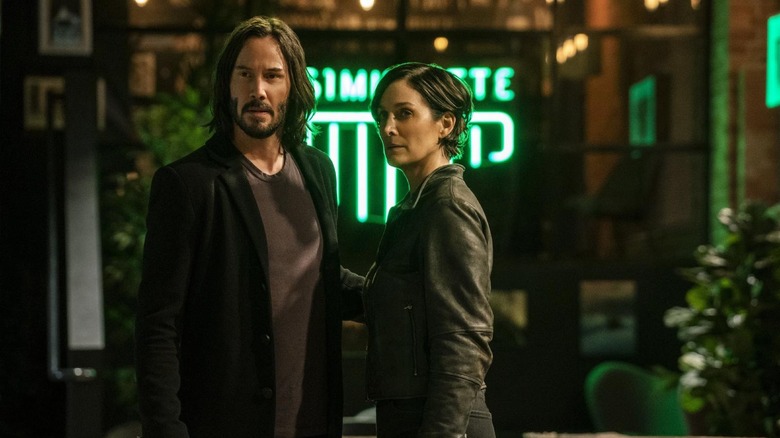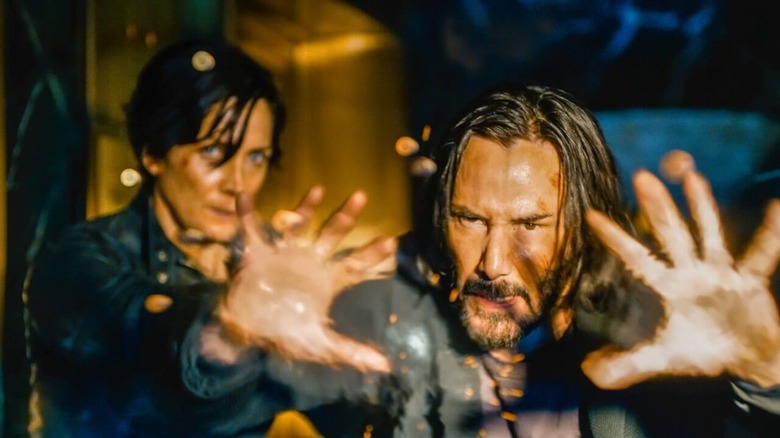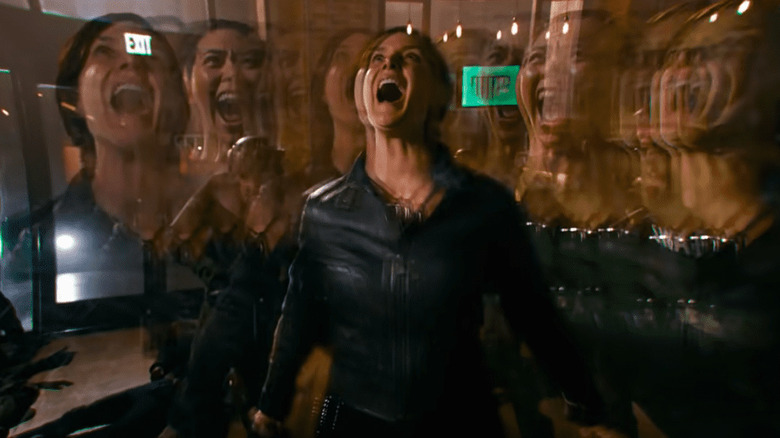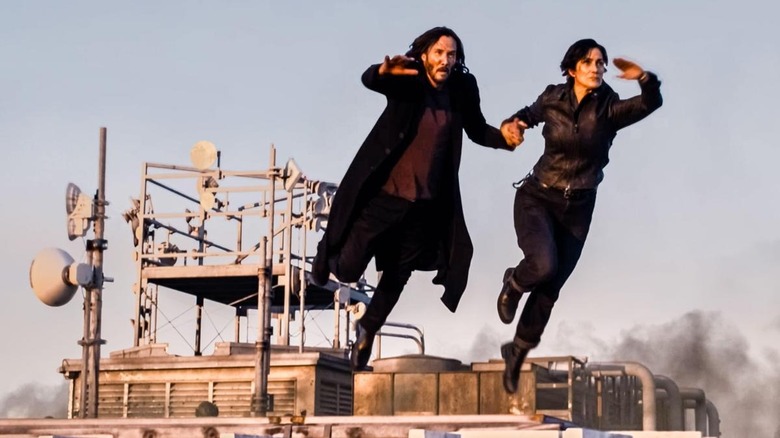The Matrix Resurrections Ending Explained: Love Never Dies

Nostalgia is a powerful drug. But even stronger than the power of remembering how good we once had it, is the power of wondering how good it might be. To yearn — for love, for a better life, for a better future — is to be human, and Hollywood has long tapped into that all-consuming emotion. Or maybe they've weaponized it against us and created stories of yearning so powerful that we live vicariously through them and forget what we ourselves truly want. Enter: "The Matrix Resurrections."
The fourth installment in the envelope-pushing "Matrix" series, "The Matrix Resurrections" knows the weapons it has at its disposal — nostalgia and yearning — and instead of intravenously feeding them into us like the IP-hungry audience we are, it flips things around and aims them right back at the Hollywood machine. This is not the action-packed gun-fu extravaganza of the first three films, this is, a wild, angry, funny meta take on a story that we've seen before. But first and foremost, "The Matrix Resurrections" is a love story.
Warning: spoilers for "The Matrix Resurrections" follow.
Do I Know You?

Thomas Anderson (Keanu Reeves) is a successful video game developer whose game-changing "Matrix" video games put his company Deus Machina on the map. Now, Warner Bros. wants him to make a sequel to the beloved trilogy, his business partner Smith (Jonathan Groff) tells him (more like demands of him), which leads Thomas down his latest existential meltdown. He's had these before: he can't tell what's real and what's fiction, and starts to think that he is the hero of his own video game series.
He spends his days in a drugged-up haze from the blue pills his Analyst (Neil Patrick Harris) prescribes him, suffering through long meetings with his annoying millennial colleagues and counting down the hours until he can make his way to his local coffeeshop — hilariously called "Simulatte" — where he can brush shoulders with Tiffany (Carrie-Anne Moss), a married woman for whom he's held a candle for years. Somedays he builds up the confidence to talk to her, and whenever he does, something seems to spark in her too. "Do I know you from somewhere?" she asks curiously, before her husband ("John Wick" director and Reeves' former "Matrix" stunt double Chad Stahelski) interrupts them and drags her away. His all-consuming yearning for Tiffany is clearly the only thing keeping Thomas going, so much so that it bled into his original games, where Trinity bears a canny resemblance to Tiffany, something that only intrigues her further.
It's from this unhappy existence that Neo is awakened once again by Morpheus (well, a modal version of Morpheus played by Yahya Abdul-Mateen II) and discovered by Bugs (Jessica Henwick) and her crew after years of searching for what many believed to be an urban legend. But as his limp real-world body is pulled out of its pod by one of Bugs' friend-shaped machine helpers, he notices a pod across from him containing a slumbering human who looks just like Trinity. And his mission is set.
Analyze This

Neo is pulled back into the real-world war, though it's not as simple as humans vs. machines anymore. Long after Neo and Trinity established their fragile ceasefire with the machines, the war had begun again — but between factions of machines, which created an Anomaly within the new Matrix. But 60 years have passed since Neo and Trinity established that ceasefire, and the new human sanctuary of Io, led by an elderly Niobe (Jada Pinkett Smith), wants to put down their weapons and put down roots instead.
So Neo, with the help of Bugs and her crew, sets off on his own mission to rescue Trinity from the Anomaly that has her trapped in the Matrix. They enter the Matrix — fighting off a newly awakened Smith (Groff, wonderfully evoking Hugo Weaving) and other Exile programs that want to see the Matrix returned to its former glory.
Neo manages to make his way to the motorcycle repair shop where Tiffany works, but just as they lock eyes and are about to run into an embrace, time freezes. Neo's Analyst reveals himself to be the Anomaly — a program created to study the human psyche but realized the Matrix could be perfected beyond the '90s utopia it once was. No, this is a Matrix powered by yearning, revolving around the unrequited romance between Neo and Trinity — crossing paths and longing for each other, but never truly connecting. The Analyst had resurrected Neo and Trinity himself, healing their broken bodies and noticing that all the time they screamed in pain they grasped for each other, and decided to put that to use. It took him a few tries to perfect it — past versions of the Matrix had been brought down whenever Neo and Trinity reunited — but he found success in the formula that weaponized their yearning and brought them close, but just out of reach with each other.
It's unrequited romance as a weapon, yearning as a tool to enslave humanity and keep them subservient — something so much grosser and fouler than the oppression by capitalism that we saw in the first "Matrix." The machines are using our emotions and our love for escapism against us, a cutting parallel to how the Hollywood machine does the same.
Time To Fly

Neo, Bugs, Modal Morpheus, and co. team up with Sati (Priyanka Chopra), the now grown-up exile program he met in "Revolutions," to stage a heist and free Trinity from the Matrix. Trinity's life is now being held hostage by the Analyst, who threatens to kill her if Neo does not return to his pod and reenter the Matrix. They stage a heist both from outside and within the Matrix — Sati and Bugs working to physically pry Trinity out of her pod, Neo going to war with the Analyst and his army of Agents from within.
After fighting tooth-and-nail, the Analyst presents Neo with a challenge: if Trinity offers to leave the Matrix of her own free will, she can go with Neo, but if she refuses, Neo must permanently return to the Matrix. Neo, putting all his faith in Trinity, takes it. And they all congregate in the coffee shop where Thomas Anderson and Tiffany had so many of their missed encounters, a perplexed Trinity walking past a sea of Agents and coming to stand between the Analyst and Neo. Neo pleads with her, but she doesn't recognize him, and becomes distressed as her children and husband call out for her from outside. Just as she appears to choose her family with the Matrix, something suddenly snaps, and she remembers who she is.
Everything falls into Chaos as the Agents attack and the Analysts prepare to kill both Neo and Trinity, only for Smith to swoop in and save them — ever the rogue program. Neo and Trinity flee the masses of Agents (who are now just possessed people all over the Matrix instead of men in suits), making their way to the top of a skyscraper where they jump, Neo hoping that he can fly again. But he falls and instead finds himself dangling from Trinity's hand as she instead takes flight.
"The Matrix" series has always been profoundly uninterested with the chosen one narrative the first film so majestically utilized, and "The Matrix Resurrections" goes one step further by establishing that Neo and Trinity come as a pair: the Chosen Two, you might say. So it's apt that "The Matrix Resurrections" boils down not to Neo's choice, but to Trinity's choice. The power of love is what unites them (as it did in the first, second, and third films). The end of the film, which sees Trinity now in control of the Matrix (in what also appears to be a clever meta-nod to the Trinity Problem, in which strong female characters are relegated to supporting roles to the male chosen-one protagonists). Trinity and Neo confront the Analyst and promise that he will see the consequences of his actions, and that the Matrix will be remade once again, for the better — one that is born out of love and romance, and one that does not weaponize yearning against us.
Read this next: The Best Movies Of 2021 So Far
The post The Matrix Resurrections Ending Explained: Love Never Dies appeared first on /Film.
from /Film https://ift.tt/3FpieTY
Comments
Post a Comment